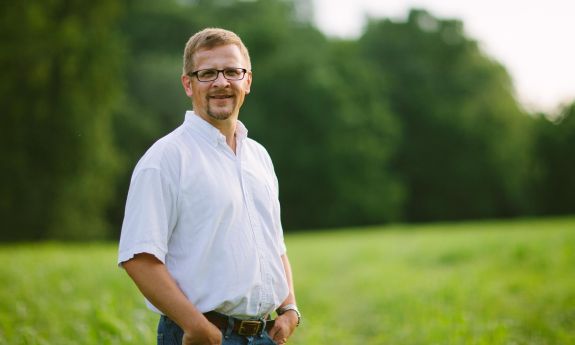Norman Wirzba Named Director of Research for Climate and Sustainability
Divinity Professor known as a convener and scholar of the "Anthropocene"

“For me, the big question has always been, ‘How do people live beautifully and justly with each other and with the world?’ That’s the animating question behind so much of what I do,” Wirzba said.
A divinity professor may seem like an unconventional choice to direct a research program, said Toddi Steelman, vice president and vice provost for climate and sustainability, who helms an effort that has $36 million behind it to date.
“Norman was a key contributor to our efforts to plan and organize the climate commitment and he held the moral center for us,” Steelman said. “He’s also a natural convener, one who helps people work together and listen to each other carefully.”
Rather than simply being somebody who hands out money and oversees the research enterprise, Wirzba sees the director of research for climate and sustainability as a connector, someone who will bring Duke’s many parts together to think about what it means to be a scholar or citizen in this changed and changing world.
Through his teaching at Duke, often with colleagues from many different departments, Wirzba has been exploring the “Anthropocene,” or human-made, age of the Earth.
“The Anthropocene, as it's described to us by earth system scientists, suggests that the relationship between human beings and the world has now fundamentally changed,” Wirzba said in his cozy divinity school office with a gothic window toward Duke Chapel and floor-to-ceiling bookshelves stuffed with a diverse array of topics from faith to microbiology.
“If in previous epochs, nature dwarfed human power, circumscribed it, often humiliated it, now it's the reverse,” he said. “There isn't a place on Earth, ranging from cellular to atmospheric levels, where the human imprint isn't visible.”
His aim is to help create climate-related opportunities across the entire university. “What I'm interested in is figuring out how do we bring the best out of the people who are here who have a deep personal concern and commitment to want to address the major problems of our time.”
“For example, we can no longer make sense of anything happening in the world without also thinking about how human economies – what Duke’s Peter Haff calls the technosphere – have altered all sorts of Earth systems and biochemical processes,” he said. “What does that mean for economics, politics, law, religion, you name it?”
“At the end of the day, climate change is a cultural issue,” Wirzba said. “We're talking about values, we're talking about meaning. What kind of world are we in? Those are enormous questions, and they involve all the university’s disciplines.”
“I'm hoping that there will be new friendships and fellowship happening all across the campus, as people come to work together on Duke’s climate commitment,” he said.